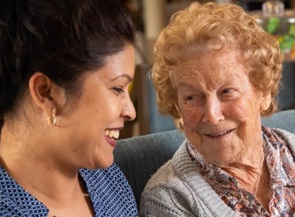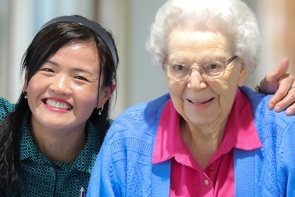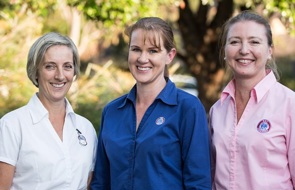The first step to navigating the aged care system is to consider how to face up to what is ahead and this may involve a series of conversations with someone else you are acting on the behalf of. You will need to gain legal permission to act for someone else and to do that, know what type of substitute decision makers there are. You will need to know how to get a My Aged Care client record. Next you will need to consider what is involved to get affairs in order as well as what is involved in advanced care planning and directives.
Now that you have a basic understanding of how things work and what the words and terms mean, you are ready to take the first active steps in the agedcare101 journey.
Handy Hint - Did you know that if you can click the CC at the bottom righthand side while the video is playing, captions will appear. To get rid of them, click CC again.
View transcript of video hereThings you need to navigate the aged care system?
- Moving into an aged care home is a momentous step for you and your family and a highly emotional time for all concerned. It’s important to realise that, while your family’s circumstances are unique, you are not alone.
- There needs to be an honest and open conversation about your current situation and the ‘what ifs’. It’s always best to start the conversation sooner, rather than later.
- Remember, if you are caring for or advising a loved one who needs to find aged care, and you plan to help them navigate the process, you will need to have their permission to act on their behalf.
- A substitute decision maker may need to be appointed.
- You will need to contact My Aged Care and create a client record.
- Your loved one's financial and personal affairs will need to be in order.
- We cover all of this in detail over the next few sub chapters.
2.1 How do I face up to aged care?
Moving into an aged care home is a momentous step for you and your family and a highly emotional time for all concerned. A lot of practical steps need to be taken, often under time pressure. It’s important to realise that, while your family’s circumstances are unique, you are not alone.
We are here to help with advice on how to manage the emotional highs and lows. Also please consider seeking advice or assistance from a trusted friend or relative, the GP, a counsellor, or a member of the clergy, for example. You can also contact the National Aged Care Advocacy Line on: 1800 700 600. The My Aged Care contact centre can also help: phone 1800 200 422 or visit the website.
Whoever raises the topic, at some stage there needs to be an honest and open conversation about your current situation and the ‘what ifs’.
And it’s always best to start the conversation sooner, rather than later.
You have much more control and you'll get a better outcome if you act before a crisis is upon you.
It is worthwhile considering the following when contemplating different courses of action.
- Your health and medical status
- Where you might live if home was no longer an option
- Your key decision-makers if you lose capacity
- Your end-of-life wishes?
- Whether your will needs updating
- Your financial situation and whether you need financial advice
- The possibility of needing to sell your home to help pay for your accommodation and care
- The people, pets and other things you might be concerned about
- Any special requests or wishes about your future
Plus:
- Location of key documents and passwords
However you choose to approach the topic, there will be complex questions and emotions - for you, your family members and others close to you. Here are our tips for giving everyone the best chance at a good outcome:
DO:
Everyone has the right to take risks and make decisions about their own life
Even when someone is very ill or has early signs of dementia, they need to be able to express their opinions and preferences and have them respected. The exception is when someone is unconscious or has severe cognitive impairment from dementia or other brain disease or injury.
Think of it as an ongoing series of conversations
Ideas can evolve and opinions change over time. Available options can change. Unless the situation is critical, there is no need to finalise decisions in a single conversation.
Start talking sooner, rather than later.
Allow time for several discussions with minimal pressure involved. Don’t wait for a crisis.
Be open, honest and respectful
Be sensitive to everyone’s needs and concerns but don’t avoid being truthful either.
‘Walk a mile in my shoes’
If you are the person who needs to think about aged care, remember to consider the impact your attitudes and decisions can have on family members and loved ones. What if you were in their shoes? While you may be determined to stay living in your home at all costs, what impact will this decision have on your loved ones? Are they worried over-stretched trying to help you.
If it is your parent or another loved one who is having to consider the future in these terms, avoid the trap of the role reversal. They may be in a difficult patch of life but they are not children. They are adults who have led full and meaningful lives and now they are dealing with complex emotions and feelings of change and loss. Ask yourself: How would you like to be spoken to?
Mind your language
No matter how smooth and understanding the process has been or how appealing the aged care home, these are difficult conversations. Nobody likes to be ‘moved to a nursing home’. It implies total loss of personal power which should never be the case. Be positive and considerate. Avoid language that implies the person is a ‘problem’ to be solved. Find common goals and work together as much as possible. Focus on getting the right care and support, retaining as much independence as you can.
Listen – don’t make assumptions
Don’t assume you know what your parent or loved one will think and feel. At the same time, don’t assume you know what your adult children or other loved ones will want for you. Listen to each other with an open mind and be prepared to accommodate surprises.
Make it a collaboration
One of the new policy mantras in aged care is to ‘do with’, not ‘do for’. It’s an acceptance that most people hate to have their sense of choice and control taken away, even when they know they need other people’s assistance. However well-meaning it might be, it’s never a good idea to simply ‘take over’. If you’re looking at care options, do it together. Sit in front of the computer together, make phone calls together, keep lines of communication open and transparent. If you want to hand things over to someone else, that’s fine as long as it’s your decision, on your terms.
Get outside help if you need it
You might want to consider seeking advice or assistance from a trusted friend or other relative, the GP, a counsellor, or a member of the clergy, for example. You can also contact the National Aged Care Advocacy Line on: 1800 700 600. The My Aged Care contact centre can also help: phone 1800 200 422 or visit the website.
Don'ts
- Accept old stereotypes about aged care. Aged care is very different these days and you can expect to be pleasantly surprised
- Apply pressure on someone to get an outcome - and never resort to emotional blackmail.
Plus:
- Assume that because someone has lost capacity to do some things, that they've lost all capacity.
Start talking sooner, rather than later and think of it as an ongoing series of conversations.
NOTE for family members and carers:
If you are caring for or advising a loved one who needs to find aged care, and you plan to help them navigate the process, you will need to have their permission to act on your behalf.
2.2 How do I get legal permission to act on someone's behalf?
Acting on someone else's behalf
Whether you are making your own aged care plans or you are acting on behalf of someone else, you should have some important legal arrangements in place.
You will either:
- give permission to someone you trust to make decisions on your behalf in the event that you are no longer able to make decisions yourself
or:
- obtain permission to act and make decisions on another person’s behalf
Many people need to consult a legal practitioner to put the arrangements in place that allow someone else to make certain important decisions on their behalf, should they lose the capacity to make those decisions themselves.
It is important to have thought about this and made the arrangements for substitute decision makers before the need potentially arises.
Some people put these arrangements in place years before they ever think they could need them. Even if you have done that, you should review your documents now in case things have changed.
What is 'capacity'?
We make decisions for ourselves all our adult lives and we expect to continue to make our own decisions, regardless of our age.
But there are some situations and certain kinds of decisions where it may not be possible; particularly if we become unwell. In legal terms, your ability to make important decisions yourself is referred to as your ‘capacity’.
You are considered to have the capacity to make decisions if you can:
- understand the facts involved
- understand the main choices
- weigh up the consequences of the choices
- understand how the consequences affect you
and:
- communicate your decision
It is rare for someone to not have capacity for any decision making at all – usually only if they are unconscious or have a severe cognitive disability.
The kinds of decisions where it is important to have 'capacity are when your health, independence, or financial situation might be put at risk. e.g. you want to have capacity to make a decision about selling your home or having a major medical treatment or operation.
There are several different types of legal representatives you can appoint as your substitute decision makers, depending on what roles and responsibilities you want them to have.
There is some variation in the terms and titles used in different states and territories but the main roles include:
- Enduring guardian
- Enduring power of attorney
- Administrator
- Guardian – public or private
and:
- Nominee
These roles are explained in detail in the next section - 2.3 Your substitute decision makers
If you are acting in a decision making role for someone else who needs aged care, you should ensure you have copies of the relevant documentation proving your legal status.
2.3 What are the types of substitute decision makers?
Substitute decision makers
In this section we look at the following common substitute decision making positions:
- Enduring power of attorney – finance, property and legal decisions
- Enduring guardian – general health and lifestyle decisions
- Administrator – finance and legal decisions where there is no enduring power of attorney
- Guardian – lifestyle and health related decisions where there is no enduring guardian
and:
- Nominee – dealings with the Commonwealth government eg. Medicare, Centrelink
An Enduring Power of Attorney is a legal document that appoints a trusted person (referred to as ‘the attorney’) to make financial, legal and property decisions on your behalf in the event that you lose the capacity to do so yourself. You can appoint more than one enduring power of attorney.
An Enduring Power of Attorney does:
- allows the appointed person(s) to operate bank accounts
- can enable the appointed person(s) to sell your property
- can enable the appointed person(s) to vote at meetings on your behalf
- is like a general power of attorney but it remains valid (endures) after you lose legal capacity to make decisions for yourself
and:
- can be anyone over the age of 18 years who can assist an individual with money or property. It can be a relative, friend or professional adviser. It does not have to be a lawyer or solicitor.
An Enduring Power of Attorney does not allow the appointed person(s) to:
DONT DO
- make a personal or medical decisions on your behalf
- make a will
- swear or affirm your affidavit
Plus:
- do anything that cannot be delegated by law
An enduring guardian is a person you appoint to make decisions about your healthcare and lifestyle on your behalf, in the event that you lose capacity to make those decisions yourself.
An enduring guardian can make decisions about:
- lifestyle considerations – accommodation, domestic duties, social and recreational activities
- health care and medical treatments including medical and dental procedures
An enduring guardian cannot make decisions about:
DONT DO
- financial affairs – including the writing or changing of wills
- voting in an election on your behalf
Plus:
- consenting to special medical treatments (e.g. new or experimental treatments) or override objections to medical treatments.
An enduring guardian must act within the principles of the Guardianship Act in the relevant state or territory – in your best interests and within the law. The legal document that authorises a person of your choice to make important personal, lifestyle and treatment decisions on your behalf is called an Enduring Power of Guardianship.
Choosing your enduring guardian
It’s good to discuss the appointment of your enduring guardian or guardians with family and other significant people.
Your enduring guardian must be:
- someone who understands your values and wishes
- someone you trust to understand the issues that they may have to consider and make good decisions on your behalf
- willing to accept the responsibility
Plus:
- at least 18 years of age
Your enduring guardian cannot be:
DONT DO
- a person who provides accommodation or support services to you for daily living on a professional basis.
Plus:
- a person (or a relative of a person) who provides medical services or any other services to support your daily living activities.
While you need to check details and definitions for your own State or Territory, the following rules apply in general to all appointments of an enduring guardian:
- You can appoint more than one person as your enduring guardian. You can choose how you want them to act on your behalf - jointly or separately
- You and your enduring guardian will both need to sign a form of appointment in front of an ‘eligible witness’.
- An eligible witness is usually an Australian legal practitioner, a Registrar of the Local Court, an overseas legal practitioner, or an approved officer from the State or Territory Public Trustee or Public Guardian.
- You can revoke or change any appointment you have made by completing a Revocation of Appointment of Enduring Guardian form.
Plus:
- You can nominate an alternative enduring guardian in the event that an enduring guardian dies or loses capacity to make decisions.
If you have already lost the ability to make reasonable judgements about managing your estate and you don’t have an enduring power of attorney in place, the state government (the relevant Office of the Public Guardian or Public Advocate) can appoint an administrator to make financial and legal decisions on your behalf.
An administrator cannot make personal and lifestyle decisions, such as where you live or what health care you may need.
If you have already lost the capacity to make your own decisions and you have not previously appointed an enduring guardian, the state government can appoint a Guardian to make personal, lifestyle and treatment decisions in your best interests.
Your enduring guardian can be:
- A Guardian can be a family member or close friend who is able to make personal, lifestyle and medical/dental decisions on your behalf. In this case it is a Private Guardian.
- If the appointment of a Private Guardian is not possible (for example if there is a dispute within the family or suspected abuse) a Public Guardian can be appointed, who is usually a Statutory Official.
DONT DO
- Make financial and legal decisions on your behalf.
A nominee is a person you appoint to act on your behalf in conducting business with the Department of Human Services for services like Centrelink and Medicare.
Before a nominee can start acting on your behalf, you need to give them your permission. This can be done online or you can complete a paper form saying that you agree to authorise them. You can phone free call: 132 300 or drop into a Government service centre.
Anyone who calls Centrelink or Medicare on behalf of someone else will need to be authorised as a NOMINEE before they can make any specific enquiries. This can be done online.
There are different ways to appoint your nominee(s). You can have:
- a ‘correspondence nominee’ or a ‘payment nominee’
- both a ‘correspondence nominee’ and a ‘payment nominee’
- a different person for each role
Plus:
- the same person for both roles
Appointing a nominee does not stop you from conducting your own business with the Department of Human Services. You can contact the Department of Human Services at any time to cancel this appointment.
State based laws for substitute decision makers
Each state and territory in Australia has its own laws covering substitute decision makers – with some minor variations.
All states offer advisory services as well as easy-to-read information, downloadable forms and useful tips and tools.
Here is a list of links to each of the main state and territory contacts:
Australian Capital Territory http://www.publictrustee.act.gov.au/ and http://www.publicadvocate.act.gov.au/
New South Wales http://planningaheadtools.com.au/ and http://www.tag.nsw.gov.au/
Northern Territory http://www.nt.gov.au/justice/pubtrust/
Queensland http://www.publicguardian.qld.gov.au/adult-guardian and http://www.pt.qld.gov.au/
South Australia http://www.opa.sa.gov.au/ and http://publictrustee.sa.gov.au/
Tasmania http://www.guardianship.tas.gov.au/ and http://www.publicguardian.tas.gov.au/home and http://www.publictrustee.tas.gov.au/
Victoria http://www.publicadvocate.vic.gov.au/ and https://www.statetrustees.com.au/
Western Australia http://www.publicadvocate.wa.gov.au and http://www.publictrustee.wa.gov.au/
2.4 How do I get a My Aged Care client record?
If you are the client – and you are looking for aged care for yourself - that’s easy, just continue reading ‘How to get a client record’ below.
If you are not the client
If you are not the client – for example, a spouse or friend calling on behalf of the client - you will need to show that you have the person’s permission to act on their behalf. See 2.2 Legal permission to act on someone’s behalf
If the person who is the client is there with you, they can give their verbal permission to get the process started.
If the client has dementia or other another health issue that limits their ability to understand the process or give permission, you will need to have legal permission to act on their behalf 2.3 Legal permission to act on someone’s behalf.
How can I get a client record?
1. Call the My Aged Care Contact Centre yourself
You can phone the My Aged Care contact centre directly on 1800 200 422. It is staffed by real people, who will answer the phone, ask you some questions and take you through the process of creating a client record.
The My Aged Care contact centre is open from 8am - 8pm Monday to Friday and from 10am - 2pm Saturday, everywhere in Australia.
2. Ask someone from an aged care home (nursing home) to help you
If you have already started talking to an aged care home (nursing home) that you are interested in, a staff member from that home may also help you set this up.
What to expect
In the aged care system, the person who needs the care is referred to as ‘the client’.
An explanation of the process
The My Aged Care Contact Centre staff member will explain the process they will undertake with you and ask for your permission to create a client record. If you creating a client record on behalf of someone else, that person will need to give their permission or you will have to provide other evidence that you have permission to do so.
You will need to provide some personal information about the client, including:
- full name
- address and contact details
Plus:
- medicare number
A series of questions
The My Aged Care Contact Centre staff member will ask some questions and conduct a simple screening process over the phone to get a basic understanding of your situation and needs.
The questions will include:
- any current or future health concerns
- how well you are managing at home with your daily life
- any safety concerns you have such as fainting or falling or security at home or concerns about abuse
Plus:
- any forms of support or help you currently have in place
The process of creating your client record could take up to 30 minutes or so.
A referral for an assessment of your needs
You will need to have an assessment by a specially trained person to work out which types of services will best meet your needs. You need to have this assessment before you can access any aged care services.
Types of assessment
There are two main types of assessment you can be referred for. See Tab 3: Getting assessed
Home support assessment
This is to identify what kinds of services might help you to stay independent and well at home. This kind of assessment will be recommended if you have less intensive support needs and could manage by getting some straightforward help at home.
Comprehensive assessment
This is for people with more complex support needs at home or who may need to move to an aged care home (nursing home). This assessment needs to be done by an Aged Care Assessment Team (ACAT) - or an Aged Care Assessment Service (ACAS) - if you are in Victoria. It is usually referred to as an ACAT or ACAS assessment.
The result
- Your basic client record will be created during this first contact with the My Aged Care Contact Centre. From here onwards, your client record will become the central file for all your details and interactions with the aged care system.
- You will be given your client number.
Plus:
- You will be advised of the next steps – usually this will be your referral to have the assessment see Tab 3: Getting assessed
Every client looking for a Commonwealth subsidised aged care service needs to have a client record. Having a client record ensures the information remains consistent and helps prevent you from having to repeat your details over and over.
The client record is created on the Government’s My Aged Care website. It contains all your relevant details in one central location, including:
- details about you and your carer(s)
- your assessed care needs
- your support plans
Plus:
- information about the services you receive
You and your carer or other representative can view and access your record, including updating personal details, reviewing your support plan and tracking the progress of referrals, using your myGov account.
Aged care service providers and assessors access your record through their own separate ‘portals’.
My Aged Care states that all personal information will be collected, used and disclosed with appropriate privacy consents and notifications, in compliance with relevant privacy laws. You can read the privacy provisions published by My Aged Care here
2.5 How do I get my affairs in order?
‘you should be putting your affairs in order’ is not code for telling someone they don’t have long to live!
The practice of sorting out your ‘affairs’ can happen at any time and, like many things in life, sooner is often better.
If you find yourself needing to think about aged care, and you haven’t thought about putting your affairs in order, you’ll need to do it now.
Simply, it means, making sure you know where all your important documents are and ideally putting them into one safe place and making arrangements to deal with any unfinished plans about your life, your finances and your wishes.
Making sure you have nominated substitute decision makers that can step in if you become unable to make decisions yourself 2.2 Legal permission to act on someone’s behalf and 2.3 Your substitute decision makers
Making sure the right people know your plans, where to find everything and any important information that will make things easier for your loved ones.
Assemble your documents
These are some of the main documents and details you need to find and put together:
- birth, marriage, divorce and citizenship certificates
- bank and credit card information
- passport
- investment details (e.g. shares, funds, trusts)
- Centrelink and Medicare details
- superannuation information
- private health insurance information
- life insurance information
- other insurance information
- house title(s); lease documents
- mortgage and loan details (e.g. house, car, etc)
- receipts and appraisals for valuables
- tax information
- your will
- substitute decision making documents eg. Power of Attorney, enduring guardian
- advance care directive see 2.3 Your substitute decision makers
- funeral information – including any plans made, wishes etc not included in your will
- names and contact details for your lawyer, financial planner, tax advisor, broker and anyone else with knowledge of - or control over - wills and finances
Plus:
- a list of all your user names and passwords for important services you perform online
Make copies of the key documents and certificates and have them certified by a person who has the power to certify the copy. The ‘Registry of Births, Deaths and Marriages’ in your state has a list of the people who are able to do that. It includes people in certain jobs, like academics, pharmacists, architects, lawyers, teachers, doctors and many others.
At the end of your life, it will also make things much easier for your family and loved ones.
Following is a list of some of the questions you should consider.
Financial and administrative matters
- Are your financial affairs in order?
- Have you nominated someone (or more than one person) to be your substitute decisions makers if you are not able to?
- Do you have a current will?
- Does it need updating?
- Have you prepared a letter setting out gifts or heirlooms for family or friends (if you’d like to do that)?
- Where are your personal valuables, like jewellery stored?
- Who knows and how can they be accessed?
- Do you make regular donations to charities or other organisations?
- Do you have an online log-in and password?
- How can they be notified in the event of your death?
- If you have life insurance, is the beneficiary information up to date?
- If you have superannuation, have you nominated a beneficiary?
- If you do online banking or other transactions online, have you made a list of your various usernames and passwords?
- Do you have the passwords, usernames, log-in details etc for any clubs or organisations you belong to?
- What about subscriptions you have?
- Does someone know where to find the important papers?
Health and medical matters
- Have you discussed your wishes for end-of-life care with your loved ones and your doctor?
- Have you considered who can make decisions about your end-of-life care if you’re not able to make them yourself?
- Are there certain treatments that you don’t want to have in certain circumstances? For example, a ventilator, use of CPR, tube feeding?
- Have you recorded these decisions in an advance care directive or appointed a substitute decision maker?
- Do you give your permission for organ and tissue donation?
- Does your doctor know these wishes?
- Who else needs to know?
Personal Matters
- Are there unresolved issues that you would like to sort out with particular people?
- Who would you like to have around you as you get closer to death?
- Are there any cultural, spiritual or religious practices that you would like carried out before or at the time of your death, or once you have died?
- Do you want to be buried or cremated?
- Do you have a burial plot? Would you like your ashes scattered in a particular place?
- What are your preferences for a memorial service? Have you shared your wishes?
2.6 What is involved in advanced care planning and directives?
We make plans in advance for many aspects of our lives, including death. We make wills, think about funerals, even choose the music we want played at the service.
Advance care planning is a process designed to help you think about, discuss and plan for the medical treatment you would prefer in the event that you become too ill in the future to express your wishes. Choosing an Enduring Guardian will generally be part of that planning process.
Advance care directives
An advance care directive is a written document that records your wishes concerning the medical treatment decisions to be made, should you become unable to speak for yourself due to illness or injury.
The document may also appoint your substitute decision maker. While it is generally focused on medical wishes, it can also include non-medical wishes for end of life such as spiritual care.
It’s a good idea to get your GP to help you make your advance care directive because they know you and your health situation and they can make sure you understand the options you might face in certain situations.
Usually it will be about your right to refuse or discontinue a treatment even if this may cause your death or make it happen sooner.
Remember, an advanced care directive is only used if you are unable to make or communicate your own decisions. The directive is then used to guide the decision making of the medical staff, your substitute decision maker if you have nominated one, and your family.
Advanced Care Planning Australia is a good place to find out everything you need to know.



















